Enpherest - MANTLE

More Posts from Enpherest and Others









COWBOY BEBOP (1999) I Session 13 Jupiter Jazz (Part 2) I Dir. Shinichirō Watanabe + Ikurô Satô


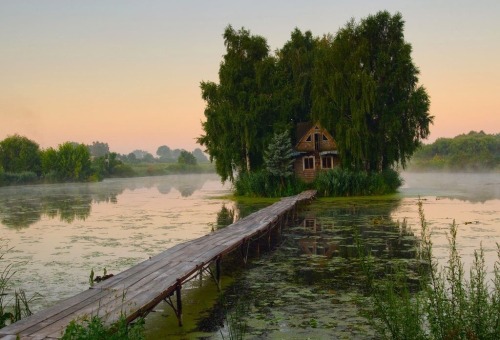








Temple of Salim
Salim/Slem/Slim, Hauran, Syria
2nd/3rd century CE
temple of medium size. The building faced the east. The south parastade, or anta-wall, which is extremely thick, and in which there were a small, stone- roofed chamber and a stair, is preserved to a height of over 3 m. The northeast angle of the opposite parastade is preserved to its full height of over 12 metres.
The remainder of the temple plan is to be traced only in foundation walls that are almost hidden in fallen building stones. The temple was set on a high podium with rich base mouldings. Its plan is most unusual; for the anta-walls project very far, and are thick enough to contain chambers. Between these antae were two pairs of columns. The ends of the antae are provided with two pilasters, the inner ones 0.81 m. wide to correspond with the columns, the outer pair 1.16 m. wide.
The wide pilasters were reproduced along the flanks of the temple, six on a side, and upon the rear wall. The interior plan is much more difficult to extricate from the debris. There are certainly two piers which carried a transverse arch over the middle of the cella. At the west end there is an apse, or niche, 2.65 m. wide, with a narrow chamber beside it on the north, and, presumably, a similar chamber on the south. Among the ruins at this point are drums of several columns of smaller scale than the exterior columns, and these I have placed in front of the west wall in the manner already seen in the interior of the Tychaion at is-Sanamen. The podium is perfectly preserved below the two parastades; between them there is no sign of a wall but only a depression filled with debris.
It must be that a flight of steps ascended at this point; but this leaves no footing for the two columns which stood between the antae- pilasters to carry the entablature above. Among the debris here I found a cap, like the top of a pedestal, with mouldings like the cap of the podium. It was not in place, but lay nearly in line with the two pilasters. In the restoration of the facade I have used this cap as a basis for supplying two tall pedestals for the outer columns. Within these; according to my restoration, the steps ascend, broken by two shorter pedestals to carry the two other columns of which there are numerous fragments.
Sources: 1, 2, 3

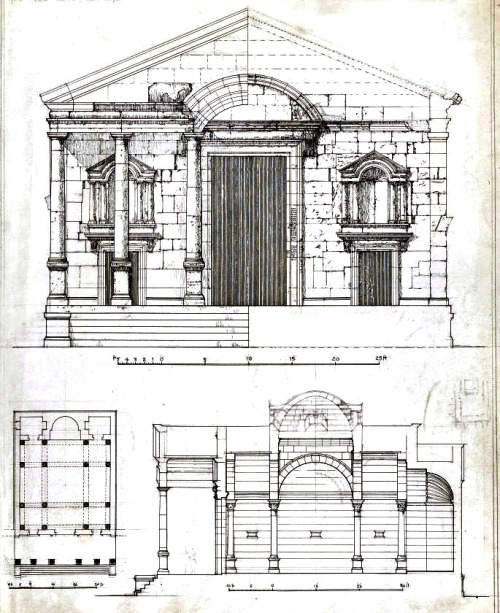
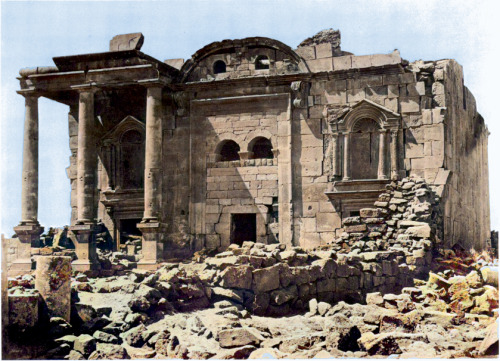


“The Praetorium”
Phaena (Al-Masmiyah), Trachon, Syria
160–169 CE
24.8 x 16.4 m
Along with the Roman temple dedicated to Tyche in nearby al-Sanamayn, the Praetorium of al-Masmiyah is the only Roman temple in the Levant that contains niches for statues in the cella. This unique feature in Roman architecture was likely inspired by pre-Roman architecture, particularly the temple of Baal-Shamin in the Syrian Desert town of Palmyra or in various Arabian cities.
The Praetorium was situated atop a podium in a temenos surrounded by colonnades and was constructed by the commander of the Third Gallic Legion between 160–169 CE during the reign of the Roman emperors Aurelius Antoninus and Lucius Aurelius Verus. It was relatively small, measuring 24.8 x 16.4 meters. It has a rectangular ground plan with a semi-circular apse that projects onto one side of the building opposite of the doorway. Both sides of the doorway contained niches reserved for statues. The interior space consisted of a single room, which was the naos, and measured 15.09 x 13.78 meters.
The Praetorium was formerly topped by a square domed roof, likely a cloister vault, which had since collapsed. The roof is supported by four free-standing columns fixed at the inner angles of cross-vaulted arches, which together form a Greek cross. On the opposite end of each columns stood a half-column, making for a total of four main columns, eight half-columns, and four quarter columns (situated at each corner) inside the naos. The arches sit on lintels that span the space between the outer wall and the columns supporting the roof. There were six niches against the walls that were reserved for the placement of statues and in the center of them was the main space, the adyton, used to hold the main statue of the pagan cult. The adyton was topped by a conch-shaped half-dome. The building had two windows, a rare feature in Classical pagan temples, and a total of three entryways. Of the entry ways, there was a principal central doorway that was higher and broader than the two side-doors.
that was constructed by the commander of the Third Gallic Legion between 160–169 CE during the reign of the Roman emperors Aurelius Antoninus and Lucius Aurelius Verus.
Sources: 1

Hiroo Isono, 1982
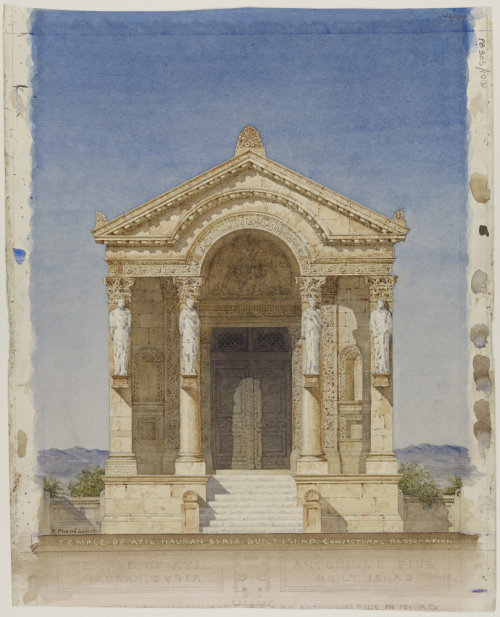
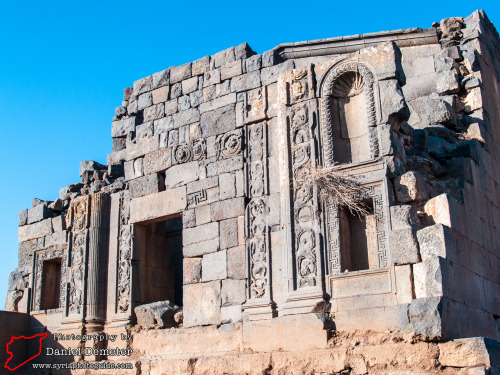
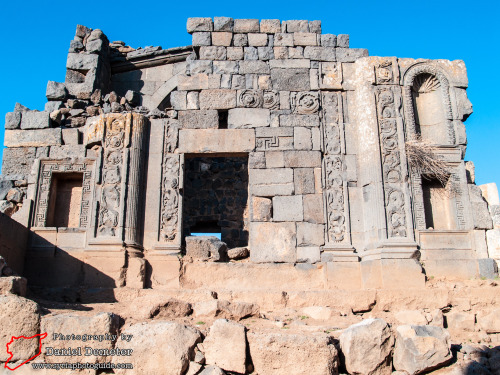
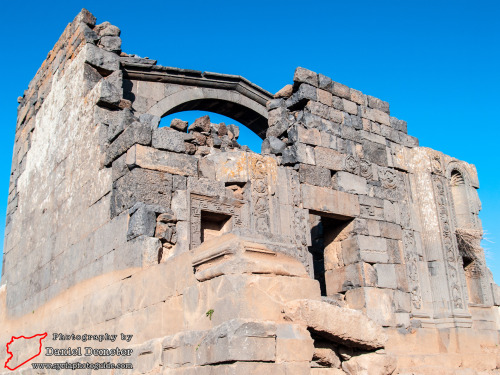
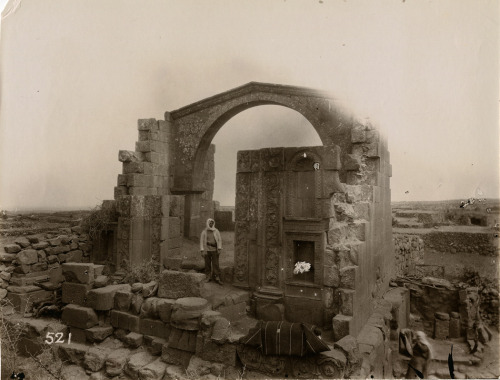


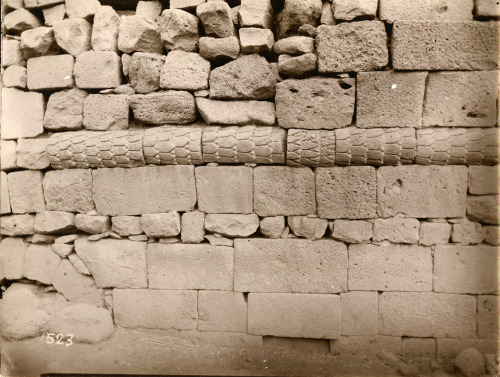

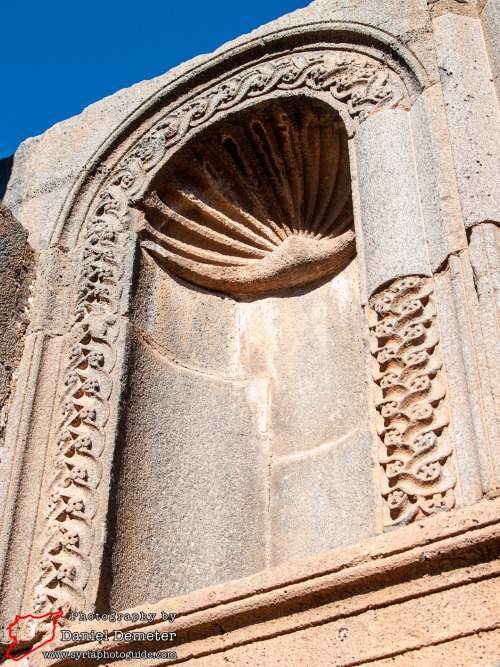
North Temple of Atil - Temple of Theandrites
Atil, Hauran, Syria
211–212 CE
This small town contains two almost identically designed Roman temples, delicately fashioned from the local basalt stone. The south Temple stems from the Antonine period (151 CE) the second or North Temple (probably dedicated to the Nabataean deity, Theandrites) was built in 211–212 CE. The southern temple is better preserved, while the northern temple has been incorporated into a modern house and tomb. Both have attractively decorated facades with fine detail.
Sources: 1, 2

kickstarter for me to become this

Endless Summer
-
 motochiri reblogged this · 1 month ago
motochiri reblogged this · 1 month ago -
 sparkleburrito reblogged this · 1 month ago
sparkleburrito reblogged this · 1 month ago -
 vague-sentiments liked this · 1 month ago
vague-sentiments liked this · 1 month ago -
 alternativeuniverse reblogged this · 1 month ago
alternativeuniverse reblogged this · 1 month ago -
 blindbullseye liked this · 1 month ago
blindbullseye liked this · 1 month ago -
 pancake-aura reblogged this · 1 month ago
pancake-aura reblogged this · 1 month ago -
 sizemorty liked this · 1 month ago
sizemorty liked this · 1 month ago -
 peener reblogged this · 1 month ago
peener reblogged this · 1 month ago -
 peener liked this · 1 month ago
peener liked this · 1 month ago -
 g00melo5-art-blog reblogged this · 10 months ago
g00melo5-art-blog reblogged this · 10 months ago -
 g00melo5-art-blog liked this · 10 months ago
g00melo5-art-blog liked this · 10 months ago -
 cdrshep reblogged this · 1 year ago
cdrshep reblogged this · 1 year ago -
 princess-adrienne liked this · 1 year ago
princess-adrienne liked this · 1 year ago -
 d4xis liked this · 1 year ago
d4xis liked this · 1 year ago -
 yougoththis liked this · 2 years ago
yougoththis liked this · 2 years ago -
 yougoththis reblogged this · 2 years ago
yougoththis reblogged this · 2 years ago -
 daphinteresting liked this · 2 years ago
daphinteresting liked this · 2 years ago -
 theruinedpariah liked this · 2 years ago
theruinedpariah liked this · 2 years ago -
 auroratigress reblogged this · 2 years ago
auroratigress reblogged this · 2 years ago -
 imelaeiou reblogged this · 2 years ago
imelaeiou reblogged this · 2 years ago -
 twinklenightpixel reblogged this · 2 years ago
twinklenightpixel reblogged this · 2 years ago -
 shnitzol liked this · 2 years ago
shnitzol liked this · 2 years ago -
 auroratigress liked this · 2 years ago
auroratigress liked this · 2 years ago -
 misslonelyeyes reblogged this · 2 years ago
misslonelyeyes reblogged this · 2 years ago -
 tropicalexposition liked this · 2 years ago
tropicalexposition liked this · 2 years ago -
 hulovesit liked this · 2 years ago
hulovesit liked this · 2 years ago -
 gyakuniji reblogged this · 2 years ago
gyakuniji reblogged this · 2 years ago -
 gyakuniji liked this · 2 years ago
gyakuniji liked this · 2 years ago -
 quii liked this · 2 years ago
quii liked this · 2 years ago -
 nervium liked this · 2 years ago
nervium liked this · 2 years ago -
 hopelessphantasy liked this · 2 years ago
hopelessphantasy liked this · 2 years ago -
 yourpromdressisbleeding liked this · 2 years ago
yourpromdressisbleeding liked this · 2 years ago -
 matthew29992291799999920 liked this · 2 years ago
matthew29992291799999920 liked this · 2 years ago -
 lumiofthestars reblogged this · 2 years ago
lumiofthestars reblogged this · 2 years ago -
 ohtze liked this · 2 years ago
ohtze liked this · 2 years ago -
 deep-space-mining-ship reblogged this · 2 years ago
deep-space-mining-ship reblogged this · 2 years ago -
 sad-moon-child reblogged this · 2 years ago
sad-moon-child reblogged this · 2 years ago -
 sad-moon-child liked this · 2 years ago
sad-moon-child liked this · 2 years ago -
 prala liked this · 2 years ago
prala liked this · 2 years ago -
 cosmoon liked this · 2 years ago
cosmoon liked this · 2 years ago -
 thebearfromthenorthwoods reblogged this · 2 years ago
thebearfromthenorthwoods reblogged this · 2 years ago -
 thebearfromthenorthwoods liked this · 2 years ago
thebearfromthenorthwoods liked this · 2 years ago -
 s0cr4t3s reblogged this · 2 years ago
s0cr4t3s reblogged this · 2 years ago -
 s0cr4t3s liked this · 2 years ago
s0cr4t3s liked this · 2 years ago -
 cl0ckw3rk reblogged this · 2 years ago
cl0ckw3rk reblogged this · 2 years ago -
 page-2 liked this · 2 years ago
page-2 liked this · 2 years ago -
 diistantpiixels reblogged this · 2 years ago
diistantpiixels reblogged this · 2 years ago -
 pinkpomeloandrose reblogged this · 2 years ago
pinkpomeloandrose reblogged this · 2 years ago -
 popsixsquishcicerolipschitz liked this · 2 years ago
popsixsquishcicerolipschitz liked this · 2 years ago

I cannot well say how I entered it, so full of slumber was I at the moment when I forsook the pathway of the truth;
139 posts